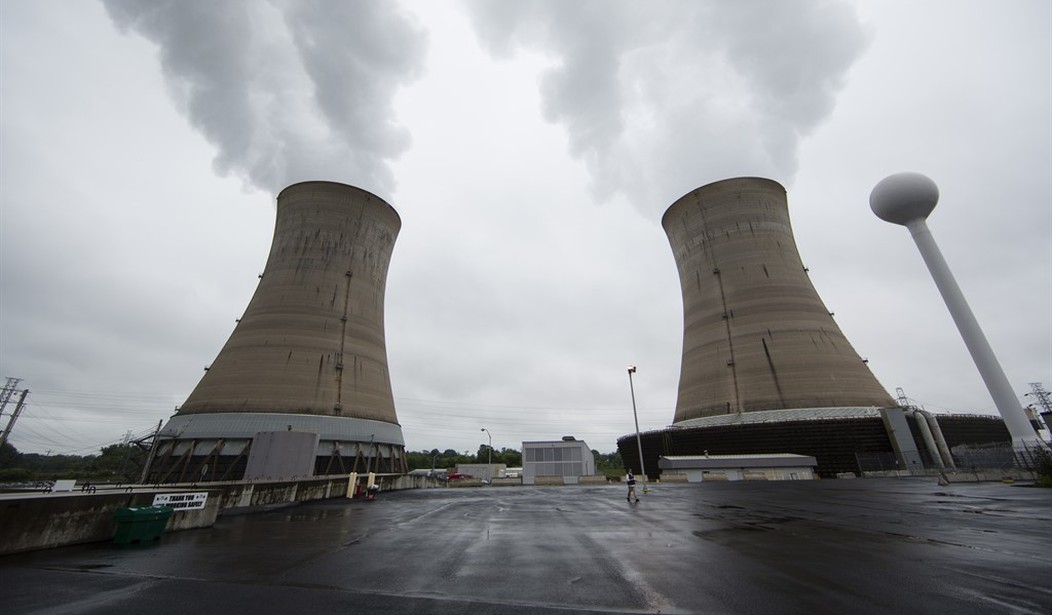Every major advance in human technology has come from an increase in energy density. Human technology started with the hardening of wooden spear points in fires made with wood or bone. Coal powered the machines, cooked the food, and heated the homes of the Industrial Revolution. In the 20th century, coal largely gave way to the higher energy density of natural gas and oil for electrical generation, as well as for transportation, cooking, and home heating - although coal is still a significant source of fuel for electrical power plants.
The highest energy-density fuel we have available today, of course, is uranium and the other elements that can power nuclear reactors. Nuclear power is an essential part of the energy picture of the future, and it even meets the desires of climate scolds, as nuclear plants emit no greenhouse gases, and unlike most "green" energy schemes, they are reliable and constant. So it comes as no surprise that tech companies involved in energy-hungry work, like the development of artificial intelligence, are beginning to look to nuclear power.
One of those companies is Microsoft.
On September 20th there was an announcement by a little known energy company located in Baltimore Pennsylvania:
Constellation announced today the signing of a 20-year power purchase agreement with Microsoft that will pave the way for the launch of the Crane Clean Energy Centre (CCEC) and restart of Three Mile Island Unit 1, which operated at industry-leading levels of safety and reliability for decades before being shut down for economic reasons exactly five years ago today. Under the agreement, Microsoft will purchase energy from the renewed plant as part of its goal to help match the power its data centers in PJM use with carbon-free energy.
There are two highly significant things about this announcement. The first is that the company operates a nuclear reactor at Three Mile Island, the site of one of the world’s biggest nuclear accidents. The reactor was due to be decommissioned in the next few years and the plant shut down completely, but it now has been given a new lease of life with this deal. If Constellation gains approval from its local authorities to go ahead with the project, it will truly be a turning point for the future of nuclear energy.
The second significant fact is that the purchaser of the entire output of this reactor for the next 20 years is Microsoft. The technology giant will build a new plant to develop AI nearby, and it will need the output of a nuclear reactor to guarantee the energy requirements of the project.
This is significant for a couple of reasons.
First, AI development reverses, in many ways, the normal setup of electrical generation. For most consumer use, electricity is generated at a fixed location and then widely distributed. In the various "green" energy schemes, this becomes more complex - with more moving parts to break - as generation is distributed, as is use. However, this AI center will be located near the nuclear plant and will use the entirety of the plant's output, making nuclear power uniquely suited for this operation.
And unlike other "clean" energy setups, nuclear power has high energy density, and it is reliable - always on, always ready, with no variations for wind or weather.
Second, even more energy-intensive operations are looking at nuclear power, in particular, the newest small modular reactors (SMRs):
It takes a very long time to build a new nuclear power station, so the spotlight is now turning to small modular reactors (SMRs) for a faster turnaround. These can be built and commissioned a great deal more quickly than conventional reactors, assuming of course that the political will is there to approve their construction in the first place.
There are many companies eyeing the opportunity presented by this new technology. Amongst others, Rolls Royce is getting in on the act – with an emphasis already on “clean and affordable”, tying the technology in to the green revolution in order to win Government backing.
Small modular reactors, while being clean and reliable, also have other possibilities - such as providing reliable energy to small rural communities. Take our little Susitna Valley community of a little over 2,000 people; at present, our electricity comes in on the grid from many miles away, and power outages due to wind and ice are annoyingly common since all our power lines are still on poles. But were our community to have one or two SMRs? Clean, reliable energy, locally generated, without the dependence on a power station in Anchorage, 70 miles away? That seems like a great option.
Another option that is being worked out now is the new molten-salt reactors, cleaner and safer still than traditional reactors.
See Related: Consequences Finally Arrive for 'Just Stop Oil' Lunatics, and the Response Is Priceless
Report: Beijing Exploits Climate Agenda in Effort to Make US More Vulnerable to China
Climate scolds, of course, oppose nuclear power, just as they oppose, frankly, most modern technology, although they make generous use of it. But the obvious advantages of nuclear power are starting to wear through the arguments of the scolds. Microsoft is, we should note, the home to a fair number of climate scolds, and indeed, Microsoft's founder - Bill Gates - while not directly running MS any longer, is still a big voice in the "OMG climate change" movement. And now the company he founded is moving to nuclear power, a move that makes good sense for their energy needs.
Maybe we're turning a corner - maybe the rule of increased energy density is finally becoming more widely accepted. We solve today's problems with tomorrow's technology, after all, and nuclear power, especially small modular reactors, has to be part of the picture.













